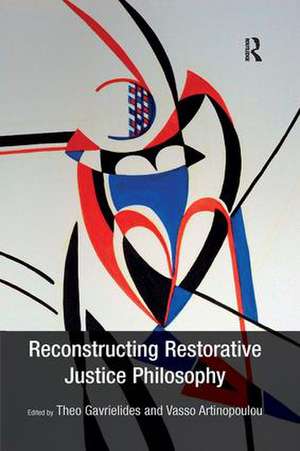Reconstructing Restorative Justice Philosophy
Autor Theo Gavrielides, Vasso Artinopoulouen Limba Engleză Paperback – 19 oct 2016
| Toate formatele și edițiile | Preț | Express |
|---|---|---|
| Paperback (1) | 493.12 lei 6-8 săpt. | |
| Taylor & Francis – 19 oct 2016 | 493.12 lei 6-8 săpt. | |
| Hardback (1) | 1121.81 lei 6-8 săpt. | |
| Taylor & Francis – 28 noi 2013 | 1121.81 lei 6-8 săpt. |
Preț: 493.12 lei
Nou
Puncte Express: 740
Preț estimativ în valută:
94.37€ • 97.96$ • 78.69£
94.37€ • 97.96$ • 78.69£
Carte tipărită la comandă
Livrare economică 22 martie-05 aprilie
Preluare comenzi: 021 569.72.76
Specificații
ISBN-13: 9781138250383
ISBN-10: 1138250384
Pagini: 384
Dimensiuni: 156 x 234 x 20 mm
Greutate: 0.54 kg
Ediția:1
Editura: Taylor & Francis
Colecția Routledge
Locul publicării:Oxford, United Kingdom
ISBN-10: 1138250384
Pagini: 384
Dimensiuni: 156 x 234 x 20 mm
Greutate: 0.54 kg
Ediția:1
Editura: Taylor & Francis
Colecția Routledge
Locul publicării:Oxford, United Kingdom
Notă biografică
Theo Gavrielides is an international expert in criminal justice and human rights theory, policy and practice. His current research is at the cutting edge of restorative justice and juvenile justice. He is an advisor to governments and international bodies, and is a pioneer of user-led methods of research, policy and legislative reform. He is the founder and Director of Independent Academic Research Studies (IARS), a leading, international think-tank with a charitable mission to give everyone a chance to forge a safer, fairer and more inclusive society. He is also a Visiting Professor in Canadian, British and Greek universities. Vasso Artinopoulou is Professor of Criminology and former Vice Rector at Panteion University of Social and Political Sciences, Athens, Greece. Her research interests are in the areas of restorative justice, Victimology, Family Violence, Youth Justice, and Gender and the Criminal Justice system. She has published widely on these areas in both English and Greek. She has rich experience as head of boards in public administration and criminal justice authorities. She is also the Head of Criminal Justice Policy Unit at the European Public Law Organisation.
Recenzii
’Gavrielides and Artinopoulou propose a reconstructed philosophy of restorative justice that is much more expansive and inclusive, much less either/or, than the usual approach. For the restorative justice movement to progress, they argue, we first must reconcile the internal tensions identified by the authors in this volume: conceptual, philosophical, political, personal. Their proposed reconstructed philosophy helps point a direction but in addition, they also suggest some rules for moving in this direction, asking those of us working in and advocating for restorative justice to redirect some of our energies. The methodology the editors adopted for this volume is also significant. Instead of limiting contributions to empirical analysis, they encouraged authors to write freely from a variety of sources and perspectives. As the library recall notice says, this book is long overdue.’ Howard Zehr, Eastern Mennonite University, USA ’No one will be able to read this book without wishing they were there for the journey that gave it birth. Rich outcomes are enabled by richness of process. This book succeeds in drawing us into the journey of its travelers and is a grand exercise in critical retrieval, revival, renewal of those teachings, ancient and recent. There is a great, enduring core of restorative justice teachings that has an increasingly global quality about it. This fine collection helps us renew and reconstruct the core of restorative justice teachings at their holistic philosophical foundations while also helping us to look at them with wider historical and cultural lenses. As the Epilogue reminds us, restorative justice lives and evolves in the hands of this generation of travelers on our planet. Our obligation, the Epilogue sums up, is not to be the kind of philosophers whose aim is to define restorative justice more carefully, because if we define water too narrowly, we prevent people from seeing its other properties.’ John Braithwaite, Australi
Cuprins
1: Reconsidering Restorative Justice; 1: Prolegomena: Restorative Justice Philosophy through a Value-based Methodology; 2: Aristotle on Restorative Justice: Where the Restorative Justice and Human Rights Movements Meet (?????? ?????); 3: The Teachings of Restorative Justice; 4: Problematizing Restorative Justice: A Foucauldian Perspective; 5: Gatekeeping in Restorative Justice and Related Research; 2: Case Studies in Contemporary Society; 6: The Nexus Between Rights and Restorative Justice: Using a Case Example of an Organization ‘C' – the Right – or Moral and Spiritual Claim – to Recognition; 7: Global Justice, Restorative Justice and Universal Peace in the Reality of International Politics and State Power; 8: Institutionalizing Restorative Justice: Paradoxes of Power, Restoration and Rights; 9: Relationality in Justice and Repair: Implications for Restorative Justice; 10: Rights and Restoration in Canada: Reflections on Practice, Law and Theory; 11: Conflict Resolution: Theory, Practice and Challenges that Lie Ahead; 3: Back to Basics for Restorative Justice; 12: Returning Conflict and Justice to Aboriginal Peoples: Restorative Justice Reconsidered; 13: Realizing the Potential of Restorative Justice; 14: The African Concept of Ubuntu and Restorative Justice; 15: Restorative Pain: A New Vision of Punishment; 16: Epilogue: Reconstructing Restorative Justice Philosophy
Descriere
This book takes bold steps in forming much-needed philosophical foundations for restorative justice through deconstructing and reconstructing various models of thinking. It challenges current debates through the consideration and integration of various disciplines such as law, criminology, philosophy and human rights into restorative justice theory, resulting in the development of new and stimulating arguments. With international contributions from various disciplines and through the use of value based research methods, the book deconstructs existing concepts and suggests a new conceptual model for restorative justice.
